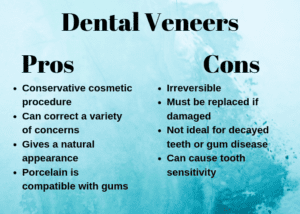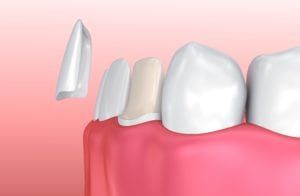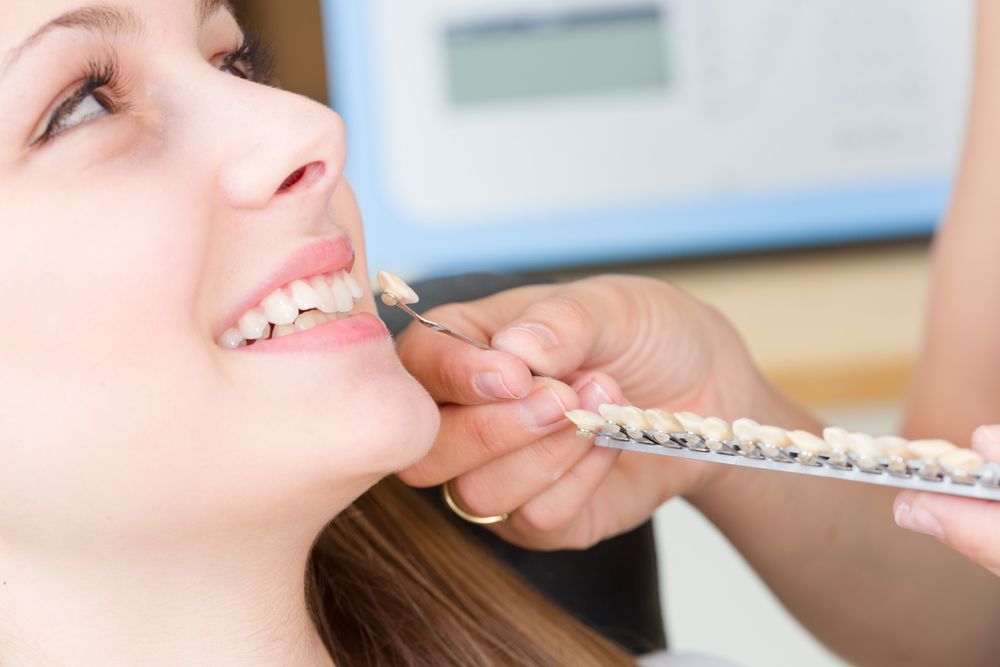Dental veneers, or laminates, are a conservative cosmetic dental treatment that uses thin shells made from porcelain or resin to enhance the appearance of your smile. They are a popular cosmetic dental treatment because they can easily correct a range of structural issues. Additionally, they can correct minor alignment issues and discolorations. Since veneers are classified as purely cosmetic, they are used on visible teeth towards the front of the mouth.

Did You Know?
Some people opt for dental veneers as an alternative to dental crowns. Although both crowns and veneers can be used to enhance appearance, veneers only cover the front surface of the tooth, while a dental crown encapsulates the entire tooth.
Frequently Asked Questions:
Are dental veneers or laminates right for me?

Dental veneers or laminates may be right for you if you are looking for a cosmetic dental treatment to correct dental imperfections. Such imperfections could include:
- Misshapen teeth
- Crooked or misaligned teeth
- Unevenly sized teeth
- Teeth with gaps between them
- Stained or discolored teeth
- Excessively worn teeth
To find out more about dental veneers and whether or not they are right for you, schedule a consultation with Tulsa, OK dentists Drs. Chris and Kristie Vinson today.
What are the different types of veneers?
There are different types of veneers including traditional and no-prep veneers. Traditional veneers are thin shells, but they need a small amount of enamel removed to make them fit properly. No-prep veneers are ultra-thin, and thus they only very minimal to no preparation.
Additionally, veneers can be made out of composite resin or porcelain. Resin veneers require less preparation, are affordable, and can be easily placed in a single dental appointment, but they are also less durable. Porcelain veneers have a more natural appearance, are highly stain resistant, and are extremely durable, but they are more expensive.
What can I expect when having dental veneers placed at Tulsa Precision Dental?
The placement process for veneers partially depends on the type of veneer being placed. Composite and no-prep veneers can usually be placed in a single dental appointment, while traditional and porcelain veneers require two dental appointments for placement.

During the first appointment, the teeth are prepared for veneer placement by having a thin layer of enamel removed. This allows the veneers to fit more naturally without looking bulky. Once the teeth have been prepared, a dental impression will be taken by placing a tray filled with impression material inside the mouth. Within a minute, the impression material will harden around the teeth, leaving a detailed mold that can be used to make a model of the mouth. This information is then sent to a dental laboratory where it is used to custom fabricate the dental veneers.
When the veneers are completed, you will return to our office for a second appointment where the veneers will be fitted and then adhered to the teeth. Before veneer placement, your teeth will be thoroughly cleaned. Then a special adhesive and the veneer are applied to the tooth. To harden the veneer in place, a special curing light will be used.
What can I expect after having my veneers placed?
Once your veneers are placed and the dental anesthetic wears off, you will be able to resume your normal routine. Because dental veneers are such a conservative treatment, there are no dietary or activity restrictions following their placement.
However, you may experience some minor tooth sensitivity, or pain associated with hot and cold temperatures, as well as with sweet foods. Because a small amount of enamel is removed for the placement of veneers, your teeth can be sensitive for about a week following the procedure. Once your teeth adjust, this tooth sensitivity should fade.
Directly after your procedure, you may also notice a few rough spots on the veneers. These rough spots are caused by excess adhesive. Normal brushing and eating should remove them within a few days after the procedure, however they can be filed down if necessary.
How long do veneers last after their application?
Dental veneers have different lifespans depending on the material, type, and how well you maintain them. Composite veneers generally last about 5-7 years, while porcelain veneers have a longer lifespan of about 10-15 years.
To get the most out of your veneers, you will need to protect them from damage. Behaviors such as nail biting, chewing ice or pens, smoking, or using your teeth to open packages can all cause your veneers to become broken, cracked, or chipped. Teeth grinding or clenching can also cause damage to your veneers, so you will want to be fit for a dental night guard to protect them.
How do I care for my veneers?
Veneers are somewhat easy to care for because they require no additional care outside of maintaining a good oral hygiene routine. This means brushing twice a day using a fluoridated toothpaste and flossing once a day. You may also want to brush after consuming highly pigmented materials to prevent staining. Although porcelain veneers are stain resistant, they can become discolored if constantly exposed to highly pigmented foods or beverages such as colored condiments, coffee, or wine.
In addition to daily care, you will need to schedule regular dental checkups and professional teeth cleanings with Tulsa Precision Dental at least once every six months. This allows our dentists to evaluate your oral health, as well as the condition of your veneers. This also allows them to professionally clean your teeth and veneers.
At Tulsa Precision Dental, your smile is our top priority. For a full range of dental services using the latest in dental technology, schedule a consultation with Tulsa, OK dentists Drs. Chris and Kristie Vinson today!



